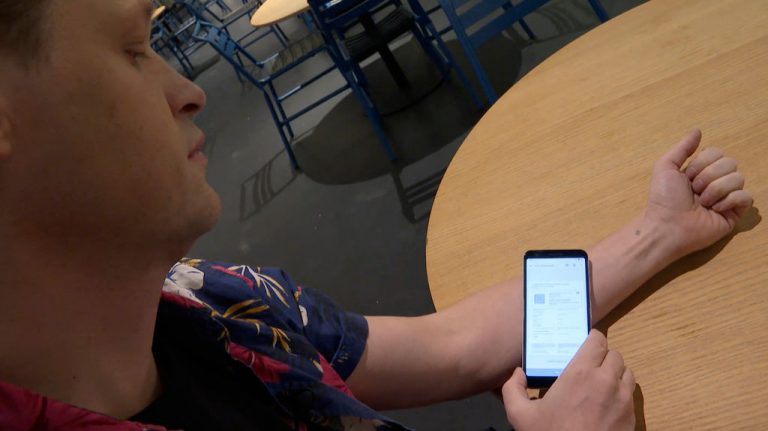Whether you like it or not, implantable subdermal microchips used to show your vaccine passport movement papers or to pay for a cup of coffee or a bundle of palm oil infused groceries are here to stay, say tech startups.
One Swedish startup, aptly named DSruptive Subdermals, has come up with an implantable chip that allows the human host to carry his medical records, specifically his vaccine passport.
“This technology exists and is used whether we like it or not,” Managing Director Hannes Sjoblad told Express. “I am happy that it is brought into the public conversation,” he added.
“New technologies must be broadly debated and understood.”
“Smart implants are a powerful health technology,” Sjoblad said, indicating he believes his company will make great strides in the healthcare business, claiming “our goal is to transform healthcare on a global scale.”
Success
You are now signed up for our newsletter
Success
Check your email to complete sign up
The device, which is be implanted in the arm, is now voluntarily commercially available at the cost of about $100.
MICROCHIP IMPLANTS AND DIGITAL CURRENCY:
- At Musk’s Neuralink, Staff and Management Paint a Vaporware Picture
- China’s Central Bank Launches Digital Currency App
- Biden’s Recent Executive Order on Digital Currencies Panned as Dangerous, People Should be ‘Worried’
Sjoblad assured that the technology is sound and safe, as it has been used as an identification system for pets for years. He went on to debunk concerns the chip could be used as a tracking device.
“If you understand how these implants work, they don’t have a battery. They cannot transmit a signal by themselves. So they are basically passive. They sit there asleep,” he said.
“They can never tell your location, they’re only activated when you touch them with your smartphone, so this means they cannot be used for tracking anyone’s location.”
A literal palm reader
Amazon likewise has introduced paying by scanning your hand, but critics fear the system can be linked to many more personal details and is yet another step towards a total surveillance state.
The system, called Amazon One, is advertised as yet another convenient and secure way to spend your money, enabling customers to have a scan of the palm of their hand uploaded and linked to their payment details.
“Amazon One is all about making everyday activities, like paying at a store, easier and more convenient for customers,” an Amazon spokesperson said according to Reclaim The Net.
“We built Amazon One to offer a quick, reliable, and secure way for people to identify themselves or authorize a transaction while moving seamlessly through their day.”
Back in 2020, when the Amazon One technology was introduced, Amazon Vice President Dilip Kumar said the company not only created the system, but also patented it and was about to license the technology to other companies.
Organic greengrocer Whole Foods, which Amazon purchased in 2017, was the first corporation to join hands, making it possible for buyers in nine stores in Seattle to pay for their goods just by hovering their hand over a transaction terminal.
Currently, Amazon One is also available in Austin at some Amazon Go cashier-less convenience Whole Foods stores.
Though the technology may seem to come in handy—in 2020, Amazon asserted One would be secure, stating the device was “protected by multiple security controls,” and “the images are encrypted and sent to a highly secure area,”—many consumers have second thoughts over privacy-sensitive information being stored—and maybe even shared—on the net.
BBC applauds Implantable wallet chip
In Europe, similar initiatives have been launched, this time involving implantable chips designed to make an easy payment. One company, Polish-British co-op Walletmor, introduced a rice grain-sized implantable chip to be inserted under the skin of the hand.
CEO Wojtek Paprota delivered a romanticized sales pitch on the device in comments to the BBC, “The implant can be used to pay for a drink on the beach in Rio, a coffee in New York, a haircut in Paris – or at your local grocery store.”
SOCIAL CREDIT, IT’S COMING
- Study Says Global Social Credit System to be $16.1 Billion Industry
- Understanding Alberta and Ontario Digital ID Systems
- Virtual Reality an ‘Effective Tool’ To Force Consumer Behavior Change: Study
Paprota declared his magnum opus is entirely safe because the chip is sealed in a biopolymer coating and does not need a power supply.
“We have daily inquiries,” he told the outlet, “and have carried out over 500 implants in the UK – but Covid caused some reduction in this.”
“This technology has been used in animals for years,” he argues. “They are very small, inert objects. There are no risks,” he said, overlooking concerns about the advent of Communist China-style social credit systems.
















